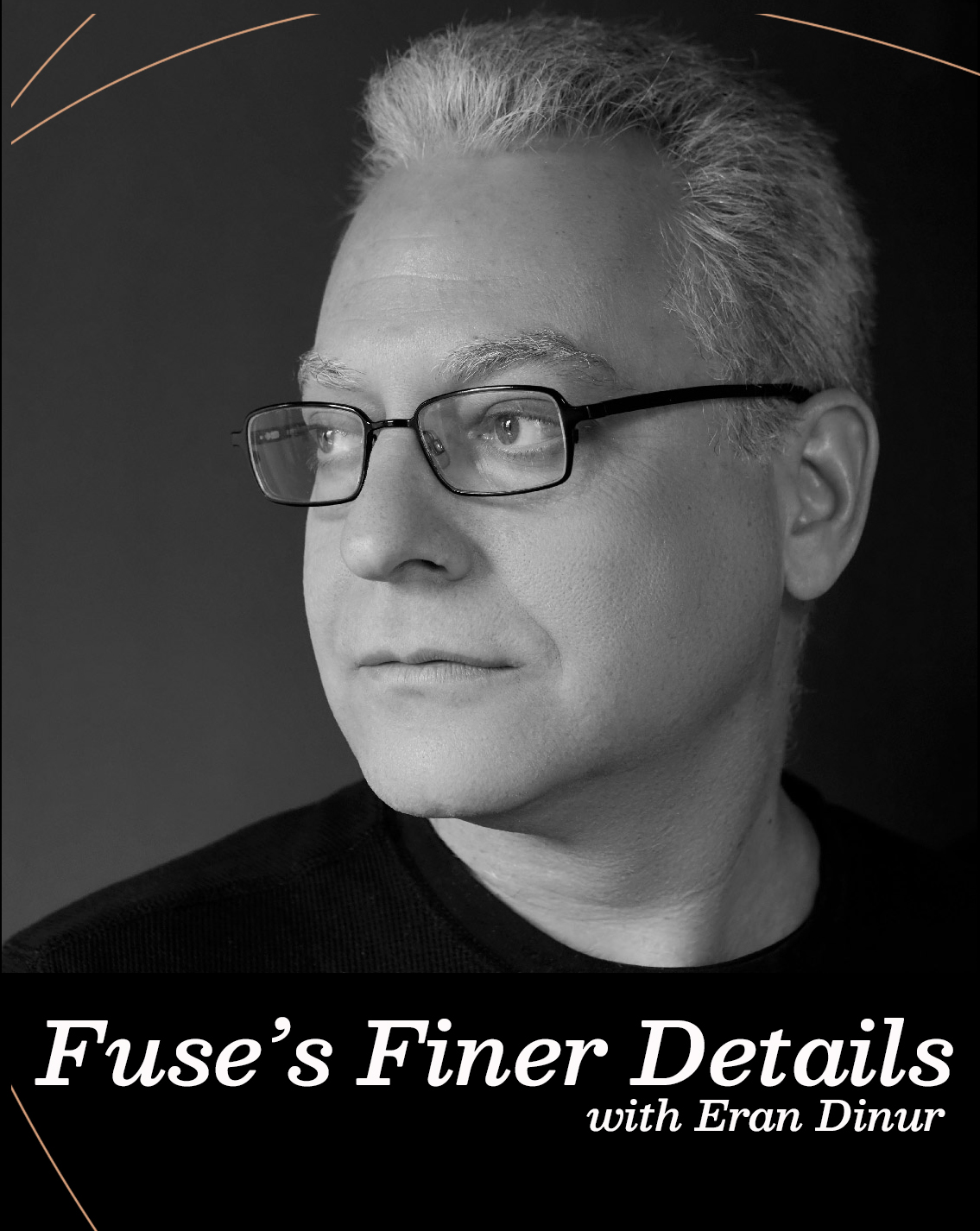Fuse's Finer Details with Eran Dinur
 Let's get to know you a little, Eran; tell us about your background. Where did it all start for you?
Let's get to know you a little, Eran; tell us about your background. Where did it all start for you?
I was a musician – I studied composition at Juilliard and wrote music (primarily for theater) for about 15 years. Maybe it was the collaboration with people from other creative disciplines (directors, lighting, set designers) that sowed the seeds for the eventual shift to VFX. Also, there are a lot of similarities between music and visual art, sound and color…
My first encounter with VFX was pretty random – I started playing with 3D software (Truespace, R.I.P.) and immediately got hooked. It became a fascination, no, an obsession. I started teaching myself 3ds Max, then Maya, then Softimage (also R.I.P.). I dabbled with everything – modeling, rigging, animation, texturing, lighting… it was a somewhat unstructured self-learning spree, but it was a lot of fun. I was (and still am) fascinated with world-building and creating 3D landscapes and natural environments.
The complete shift from a music career to VFX came with an offer from ILM Singapore. They brought me over mainly for my Vue skills (they used it on Pirates of the Caribbean back then). It was a big move for my family and me and a considerable change, starting from scratch at the age of 40. I had a lot of catching up to do, and I had to do it quickly. I did some 3D environments, matte painting, modeling for games, and finally landed in compositing. I learned a lot at ILM from the best mentors. The two years there were the best school I could hope for.
When we moved to NY, I joined Brainstorm as a compositor, then became a comp supervisor, then a VFX supervisor. I worked on about 40 films and TV projects for the next ten years. I feel fortunate that I got the chance to collaborate on the set and in post with some fantastic directors, DPs, editors, and VFX artists - and shoot in some truly beautiful locations around the world.
This is a high stake, high-stress career; what makes you get up in the morning excited about your day-to-day?
I would be lying if I said I wake up excited every morning. There are certainly those mornings when all I want is to crawl back under the blanket. But overall, I think that what keeps me excited is the anticipation of learning something new or facing a new challenge – the discovery part in this very dynamic profession.
I also always look forward to human interaction (even if much of it now is through Teams). One of the aspects I like the most about Fuse is its people – so many experienced and inventive people to learn from, professional, easy-going, down to earth, respectful to each other, and just overall fun to work with!
What drives your passion for teaching? And help others develop professionally?
I have three main reasons:
- Teaching and learning are two sides of the same coin – when you teach, you share what you learned. If you can also share the excitement and fascination you felt when you first learned what you now teach, then you are a good teacher and enjoy teaching. You are not merely passing on information; you are taking the students on the same adventure you once experienced.
- VFX is a service industry. The clients pay for our services and expect their spending to be reflected in our delivery. There is a unique satisfaction in a teacher-student interaction that is hard to find in a client-vendor interaction. That "aha" moment when you show someone a new trick, the smile on their face when you open a hidden door, is very rewarding.
- Teaching a subject forces you to understand it inside out. You must put the ideas into words, plot a clear path, and be precise – you have to dig deeper into your knowledge and skills. So, teaching is actually a fantastic way of learning.
I'm fascinated with your background and training in music and, of course, the prestige of Julliard; how does your music training tie back to your teaching efforts, if at all?
There was an element of mentoring in almost everything I did in music, as a theater musical director and teacher, and so after working in VFX for a while, I was looking for ways to become a mentor in that field too. As a result, I started teaching the senior class at the School of Visual Arts (SVA) in 2013, and this is my 10th year there. It makes me really proud to see my former students develop successful careers in VFX. In fact, six of them are currently working at Fuse.
As a VFX supervisor, I often wished I could educate some of the filmmakers I worked with about VFX. I think that every supervisor shares that feeling - often, it feels like the lack of VFX knowledge on the client side is getting in the way of a smooth collaboration. So, when Routledge reached out to me and asked if I'd like to write a book about visual effects, it was clear to me what I wanted to write about and for which target audience, and that's how The Filmmaker's Guide to Visual Effects came about.
My second book, The Complete Guide to Photorealism, is geared toward artists. Not just in VFX but in other fields where there's a need for photoreal results, like architectural visualizations or games. This book originates from my own personal fascination with digital environment and the challenge of simulating photographic reality.
What do you hope to accomplish in your new role?
I envision our training programs and initiatives as platforms for sharing ideas, techniques, and knowledge - we have amazing artists and professionals at Fuse, and there's a treasure trove of expertise. But, of course, I am also looking outward to learn from our sister companies and external resources.
In large organizations, it is undoubtedly essential that everyone operates within the same workflows, using the same procedures, templates, etc. But there is that other side to it, too – bright ideas and fresh solutions often originate from an individual who's thinking outside the box. Through our training programs, I hope we can encourage individuality while supporting the need for consistency.
The artist development aspect is also very important to me. I would like to see us supporting the heads of departments in plotting career paths and goals for artists and helping the artists achieve upward mobility. Training new talent through apprenticeship programs is, of course, part of this cycle.
Finally, I hope we'll soon be able to offer new platforms for browsing and viewing video tutorials, recorded sessions and documentation, and dedicated training environments on our unified pipeline.
We often talk about career advice for those just starting in their careers. What would be career advice for those starting, those in the middle of their careers, and pearls of wisdom for some more seasoned artists and professionals?
Seasoned professionals build their own mental structures to help them deal with the daily stress and moments of hardship. These structures are distinctly individual, formed through years of unique experiences. So as far as senior artists and professionals, my advice is as good as anyones.
Fair enough, but always be learning, right?
Yes. Learning (and really, just plain curiosity) is always a driving force at any stage in life. That place where you feel like you know it all can be dangerous.
With juniors, it's a different story. Juniors usually face similar challenges as they take their first steps in the industry, and they definitely need whatever support we can provide. We were all juniors at one time. I always remind myself of my first days at ILM, when I didn't know what parallax was and was too afraid to ask, or when I couldn't quite understand what they meant by "match the blacks" (because to me, it was all just black). Whenever the department head approached my desk, I was convinced I would get fired…
Juniors often join straight from college, and it's a drastic change. Working in VFX is different from an art school. The initial excitement and anticipation can very easily shatter under the pressure of deadlines, discouraging client notes, imposing supervisors, or just general dread – how am I doing? Am I actually good at this?
So a few things I often tell juniors:
- You'll make mistakes no matter how hard you try not to, which is fine because mistakes are a great way to learn. Only when you repeat the same mistake again and again, does it becomes an issue.
- Don't over-worry about your performance. If you don't hear anything, it's most likely a good sign! Given how much has to be done. We rarely give a pat on the back in VFX; we usually move on. But if things are not going well, trust me, you will hear from someone!
- Never hesitate to ask. Not knowing something does not make you stupid.
- If you are stuck, take a short break, try something new, or do some research. And if you are still stuck, ask for help. Nothing wrong with asking for help; it's the essence of teamwork.
When you look back, what are some of the projects you most look back on fondly? And why?
Those projects were where I got the chance, as VFX supervisor, to collaborate closely with the filmmakers and where that collaboration was mutually creative—for example, working on Uncut Gems with the Safdie brothers, whose enthusiasm and energetic flow of fresh ideas sweeps you up and inspires you. Or collaborating with Ari Aster on Hereditary. Or going on a location scout with the Lost City of Z team in the jungles of northern Colombia. Or working with Vittorio Storaro, who's not only a master cinematographer (and living legend) but also a true gentleman who cares deeply about VFX and can teach you so much about color. So many great experiences and great stories.
Which project did you learn the most from?
I think I learned from every single project I worked on. Even the ones I'd rather forget. Especially those. Knowing that there is always something to learn helps you survive the more challenging moments in this profession.
What's your ideal project?
I guess my ideal project is everybody's ideal project: exciting visual effects, beautiful footage, a collaborative, patient, and attentive client that LOVES everything you send their way, spacious deadlines with lots of time for RND and look development, a budget that covers all the VFX needs and then some… and now back to reality. 🙂
Good thing we work in make-believe. OK. This is what I'm calling the ones…
One word to describe yourself:
Mountains
One word to describe FuseFX:
Team
One word that makes you happy:
Ski
Thank you for your time, Eran. We're lucky to have you at FuseFX and the larger Pitch Black Company team. I'm excited about the development path you forge for our artists.
About Eran Dinur
 Eran is an Emmy and VES awards-winning VFX supervisor, author, and educator. His extensive on-set and in-house supervision experience include films such as “The Trial of The Chicago 7,” “Uncut Gems,” “Ad Astra,” “The Lighthouse,” “Hereditary,” “The Greatest Showman,” “The Lost City of Z,” “The Wolf of Wall Street,” and TV series such as “The Men Who Built America” and “Boardwalk Empire,” for which he received an Emmy award and two VES awards.
Eran is an Emmy and VES awards-winning VFX supervisor, author, and educator. His extensive on-set and in-house supervision experience include films such as “The Trial of The Chicago 7,” “Uncut Gems,” “Ad Astra,” “The Lighthouse,” “Hereditary,” “The Greatest Showman,” “The Lost City of Z,” “The Wolf of Wall Street,” and TV series such as “The Men Who Built America” and “Boardwalk Empire,” for which he received an Emmy award and two VES awards.
Originally a musician who wrote music for theater, Eran turned his passion for VFX into a career that started at ILM Singapore, working as Senior Compositor on films such as “Iron Man,” “Star Trek,” “Transformers,” and “Terminator Salvation.” From 2011 to 2020, Eran has served as Senior VFX Supervisor at Brainstorm Digital. He joined FuseFX in 2020 as NY Head of 2D, and since January 2023 is Fuse’s Director of Training and Artist Development.
 Eran's first book, The Filmmaker's Guide to Visual Effects, was published in 2017 by Routledge/Focal. His second book, The Complete Guide to Photorealism, was published in 2021. Eran created several online VFX courses for fxphd and wrote articles for magazines like 3D World and No Film School. He has been teaching visual effects at the School of Visual Arts since 2013.
Eran's first book, The Filmmaker's Guide to Visual Effects, was published in 2017 by Routledge/Focal. His second book, The Complete Guide to Photorealism, was published in 2021. Eran created several online VFX courses for fxphd and wrote articles for magazines like 3D World and No Film School. He has been teaching visual effects at the School of Visual Arts since 2013.
Eran's Books Available:
- The Complete Guide to Photorealism for Visual Effects, Visualization and Games
- The Filmmaker's Guide to Visual Effects
�
About the interviewer:
Oscar Negroni is the Marketing Director for FuseFX, overseeing the marketing strategy, messaging, and positioning for the FuseFX brand. He has over 15 years of experience as a digital marketer & content strategist for the private sector, start-ups, NPOs, and large-scale events. With a B.F.A. degree in film & television production from NYU's Tisch School of the Arts, Oscar's passion for all facets of production and his keen insight into market and audience trends make him a leader in the space.
"I put a lot of my energy into placing the artists up front and center, giving our clients some insights into our amazing staff who do the incredible work at FuseFX. I hope it inspires students to see a path and excites future talent to join us on our journey."


